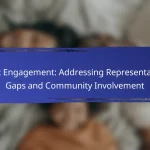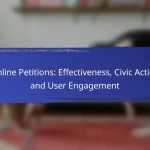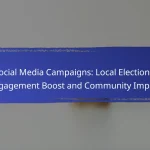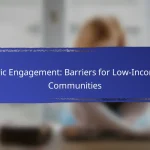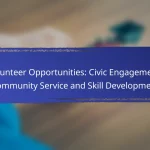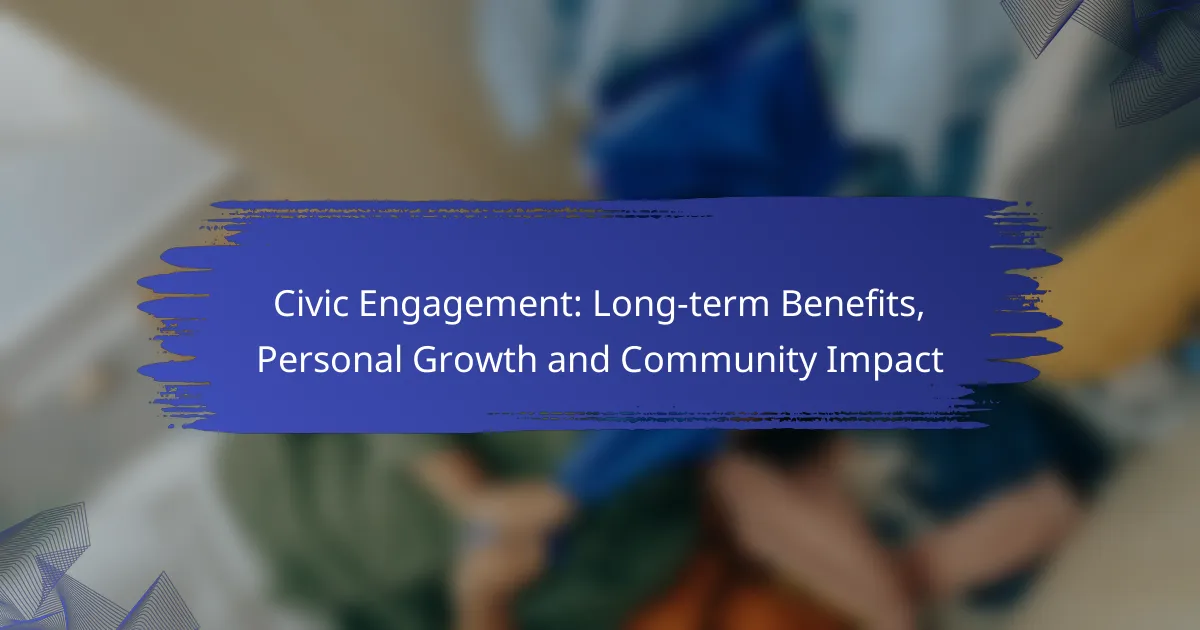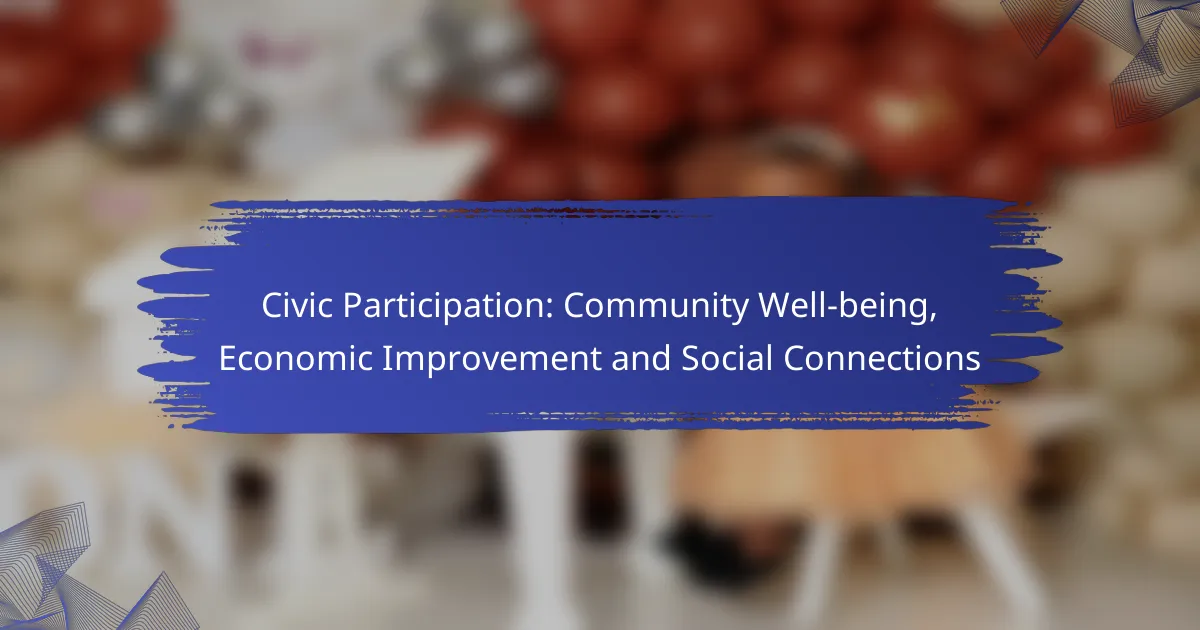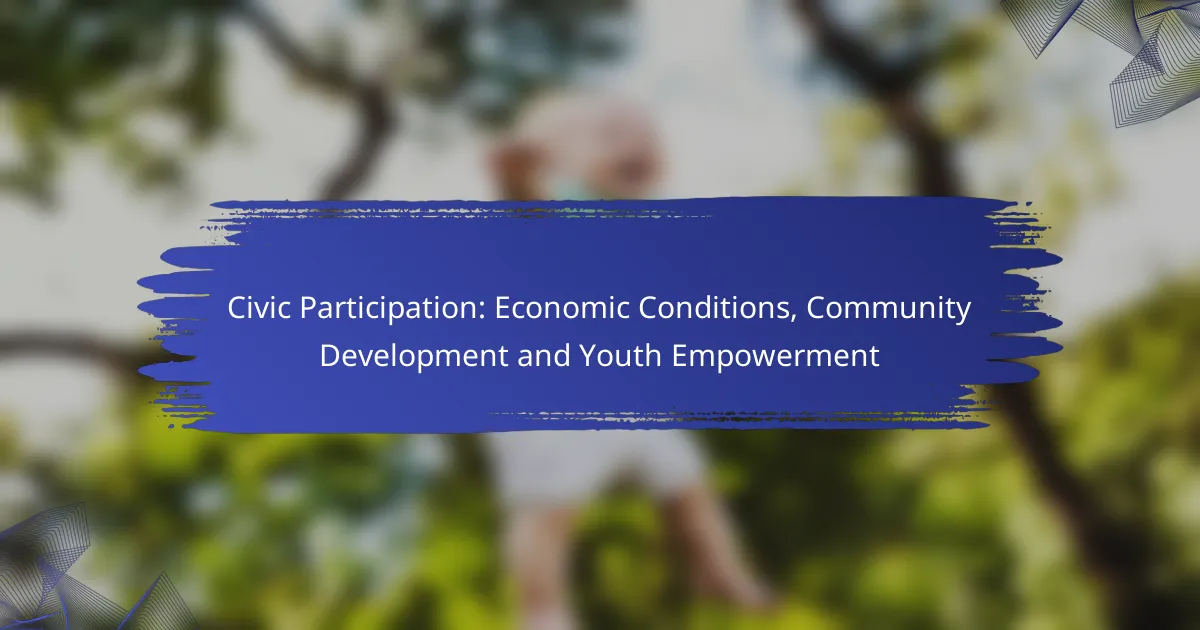Civic engagement plays a crucial role in building strong communities by fostering a sense of responsibility and connection among residents. Through active participation in local initiatives, individuals not only enhance their personal growth by developing essential skills but also contribute to the overall vibrancy and resilience of their neighborhoods.
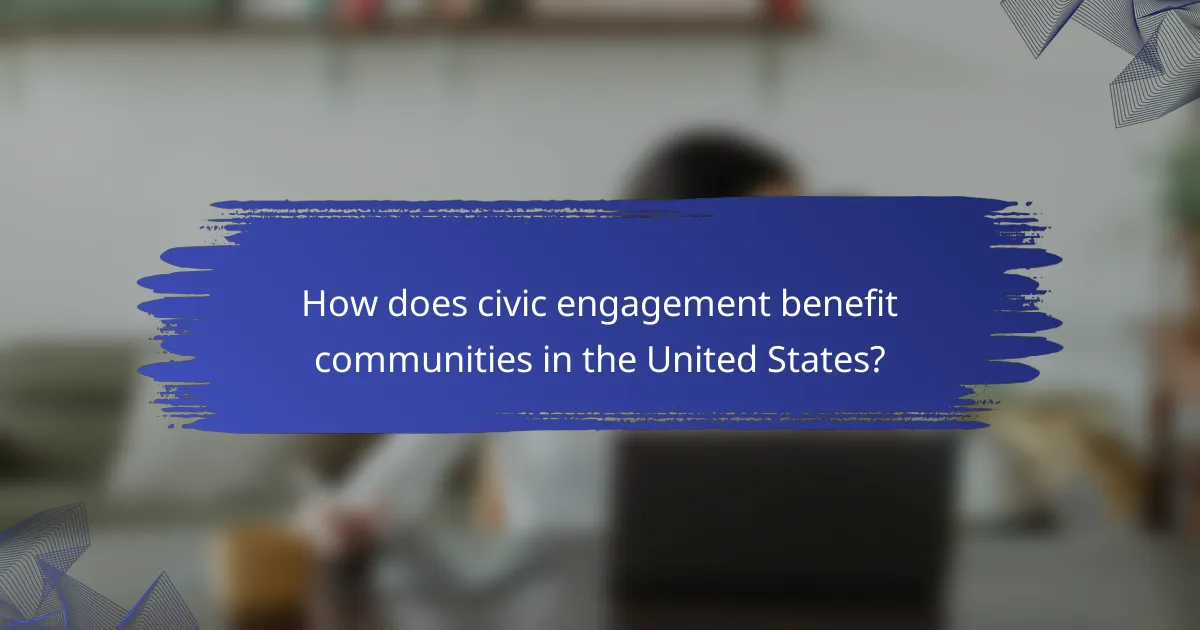
How does civic engagement benefit communities in the United States?
Civic engagement fosters a sense of responsibility and connection among community members, leading to numerous benefits for local areas. By participating in civic activities, individuals contribute to a more vibrant, responsive, and resilient community.
Increased social cohesion
Civic engagement enhances social cohesion by bringing people together around common goals and interests. When individuals collaborate on community projects or participate in local governance, they build relationships and trust, which strengthens community bonds.
Examples include neighborhood clean-up events or town hall meetings, where diverse groups unite to address local issues. This collective effort can lead to a greater sense of belonging and shared identity among residents.
Improved local governance
Active participation in civic activities leads to improved local governance by ensuring that elected officials are accountable to their constituents. When citizens engage in decision-making processes, they can voice their concerns and influence policies that directly affect their lives.
For instance, attending city council meetings or participating in community forums allows residents to express their needs and priorities, leading to more responsive and effective governance. This engagement can result in better allocation of resources and services.
Enhanced public services
Civic engagement can significantly enhance public services by providing feedback and insights from the community. When residents are involved in discussions about local services, they can identify gaps and suggest improvements that align with community needs.
For example, surveys or focus groups can be organized to gather input on public transportation or recreational facilities. This collaborative approach often leads to more efficient services that better serve the population.
Stronger community networks
Engaging in civic activities helps to create stronger community networks, which are vital for support and collaboration. These networks facilitate information sharing and resource pooling, enabling communities to tackle challenges more effectively.
Participating in local organizations, such as neighborhood associations or volunteer groups, fosters connections among residents. These relationships can lead to collaborative initiatives that address issues like safety, education, and economic development.
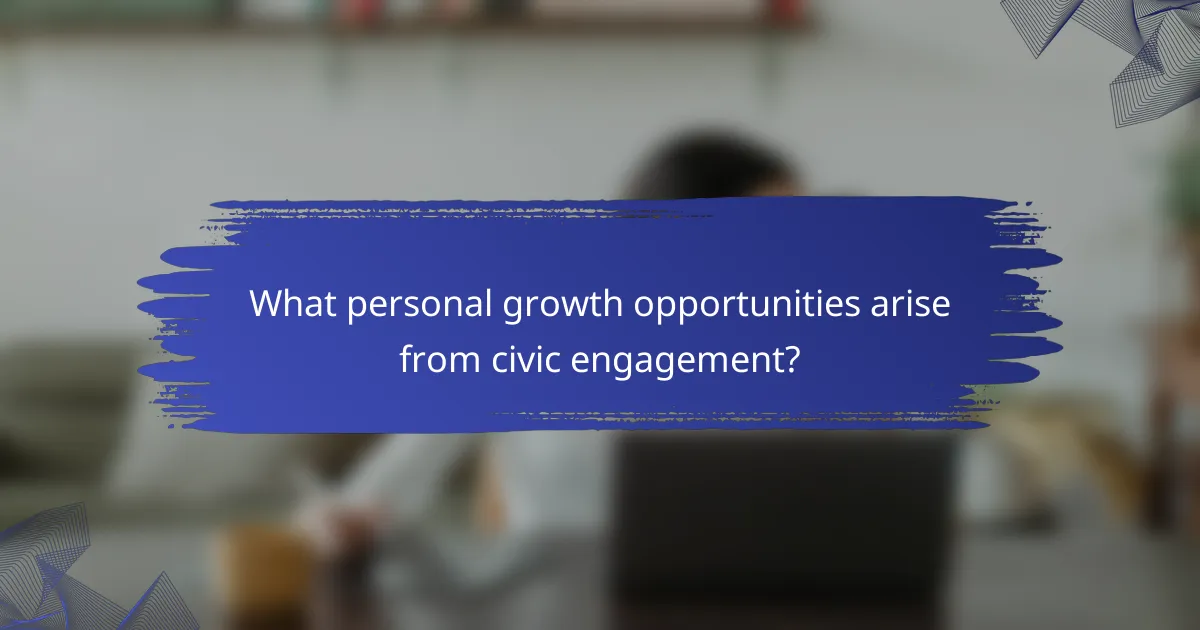
What personal growth opportunities arise from civic engagement?
Civic engagement offers numerous personal growth opportunities, including the chance to develop essential skills and broaden your understanding of community dynamics. By actively participating in civic activities, individuals can enhance their leadership abilities, improve communication skills, and gain valuable civic knowledge.
Development of leadership skills
Engaging in civic activities often places individuals in leadership roles, whether through organizing events or leading community initiatives. These experiences foster decision-making, problem-solving, and team management skills, which are crucial in both personal and professional settings.
For example, volunteering to lead a community project can help you learn how to motivate others, delegate tasks, and navigate challenges. Over time, these leadership experiences can build confidence and prepare you for more significant roles in various aspects of life.
Improved communication abilities
Civic engagement requires effective communication with diverse groups, enhancing your ability to convey ideas clearly and persuasively. Participating in discussions, debates, or public speaking events helps refine your verbal and written communication skills.
Practicing these skills in civic contexts can lead to improved relationships and collaboration with others. For instance, working on a community outreach program may involve crafting messages that resonate with different audiences, honing your ability to adapt your communication style.
Increased civic knowledge
Active participation in civic engagement deepens your understanding of local and national issues, governance, and community resources. This knowledge is essential for making informed decisions and advocating for change within your community.
By attending town hall meetings or engaging with local advocacy groups, you can learn about the political process, legislation, and civic rights. This awareness not only empowers you as a citizen but also equips you to educate others and foster a more informed community.
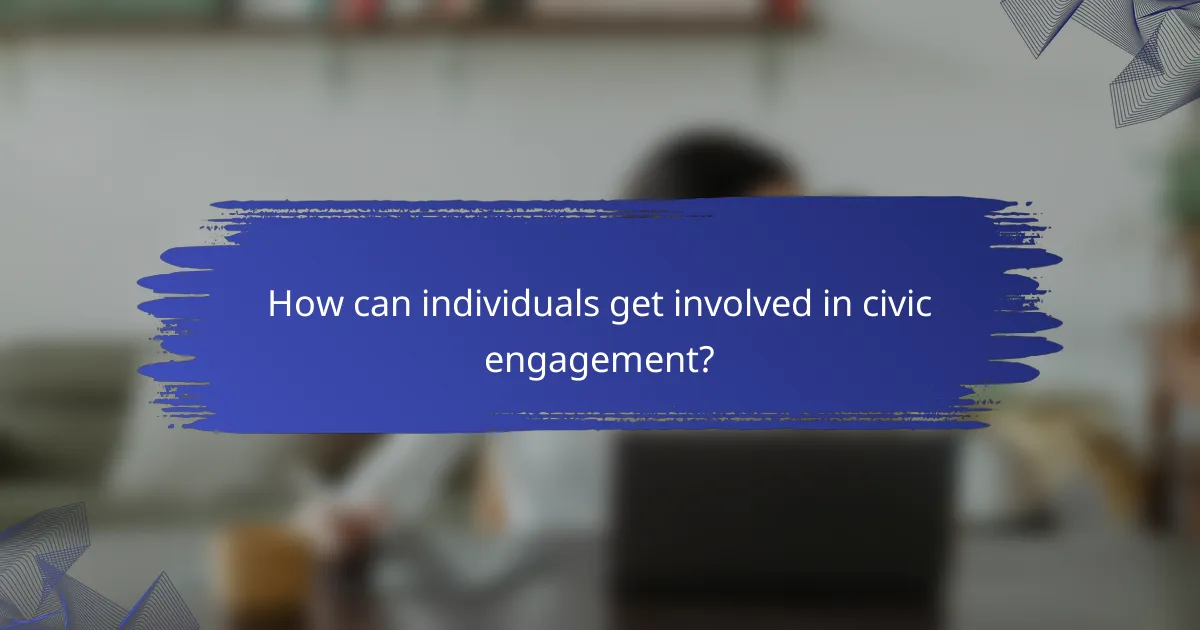
How can individuals get involved in civic engagement?
Individuals can engage in civic activities through various avenues that promote community involvement and advocacy. By participating in local initiatives, people can influence decision-making processes and contribute to the betterment of their neighborhoods.
Joining local advocacy groups
Joining local advocacy groups is an effective way to get involved in civic engagement. These organizations focus on specific issues such as education, environmental protection, or social justice, allowing members to work together towards common goals.
To find a suitable group, consider researching online platforms or community boards that list local organizations. Attend introductory meetings to gauge the group’s mission and activities before committing your time.
Participating in town hall meetings
Participating in town hall meetings provides a direct platform for citizens to voice their opinions and concerns to local officials. These gatherings typically occur monthly or quarterly and cover various community issues, from budget allocations to new policies.
To prepare for a town hall meeting, familiarize yourself with the agenda and prepare questions or comments in advance. Engaging respectfully with officials and fellow attendees can enhance the discussion and lead to more impactful outcomes.
Volunteering for community projects
Volunteering for community projects is a hands-on way to contribute to civic engagement. These projects can range from neighborhood clean-ups to organizing local events, providing opportunities to meet others and make a tangible difference.
Look for volunteer opportunities through local non-profits, schools, or community centers. Consider committing a few hours each month to build relationships and see the direct impact of your efforts on the community.
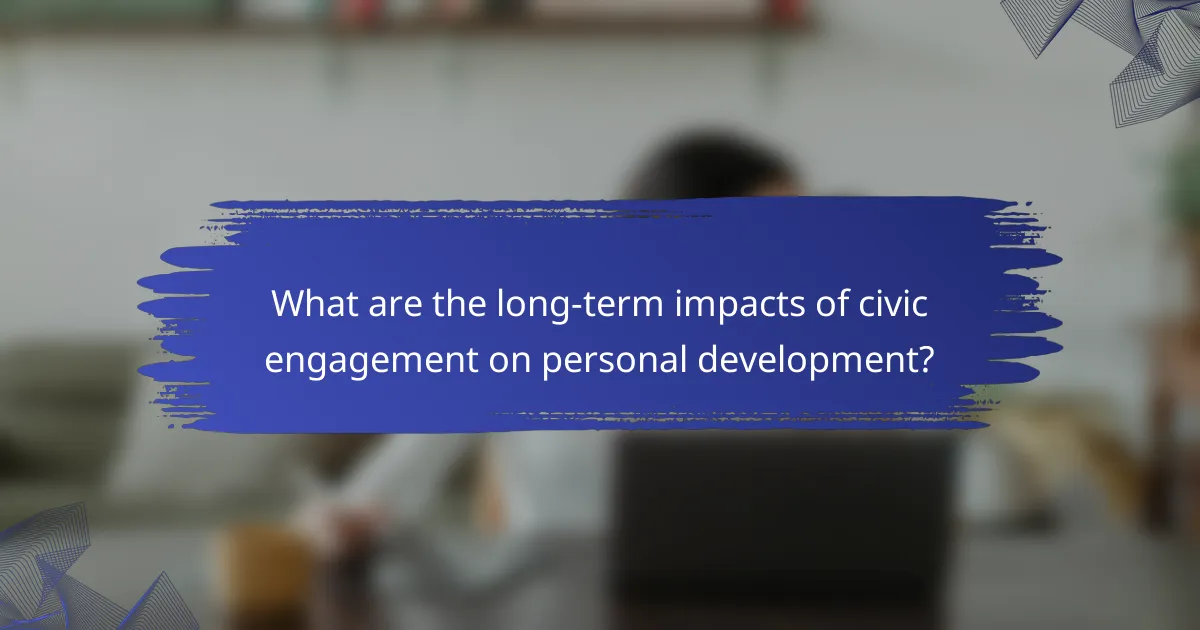
What are the long-term impacts of civic engagement on personal development?
Civic engagement significantly enhances personal development by fostering skills and attributes that contribute to individual growth. Participating in community activities cultivates a sense of responsibility, boosts self-esteem, and encourages lifelong learning.
Enhanced critical thinking
Engaging in civic activities often requires individuals to analyze complex social issues, leading to improved critical thinking skills. This process involves evaluating different perspectives, understanding the implications of decisions, and making informed choices.
For example, participating in local government meetings or community forums encourages individuals to assess various viewpoints and develop arguments based on evidence. This not only sharpens analytical skills but also prepares individuals for informed decision-making in their personal and professional lives.
Greater empathy and understanding
Civic engagement fosters greater empathy by exposing individuals to diverse communities and perspectives. By interacting with people from different backgrounds, individuals learn to appreciate varying experiences and challenges.
Volunteering at local shelters or participating in community outreach programs can deepen understanding of social issues, promoting a sense of connection and compassion. This enhanced empathy can lead to stronger interpersonal relationships and a more inclusive mindset.
Increased resilience
Participating in civic activities can build resilience by teaching individuals how to navigate challenges and setbacks. Engaging with community issues often involves facing obstacles, which can strengthen problem-solving abilities and perseverance.
For instance, organizing a community event may present logistical challenges, but overcoming these hurdles can boost confidence and adaptability. This resilience not only benefits personal growth but also equips individuals to handle difficulties in other areas of life.
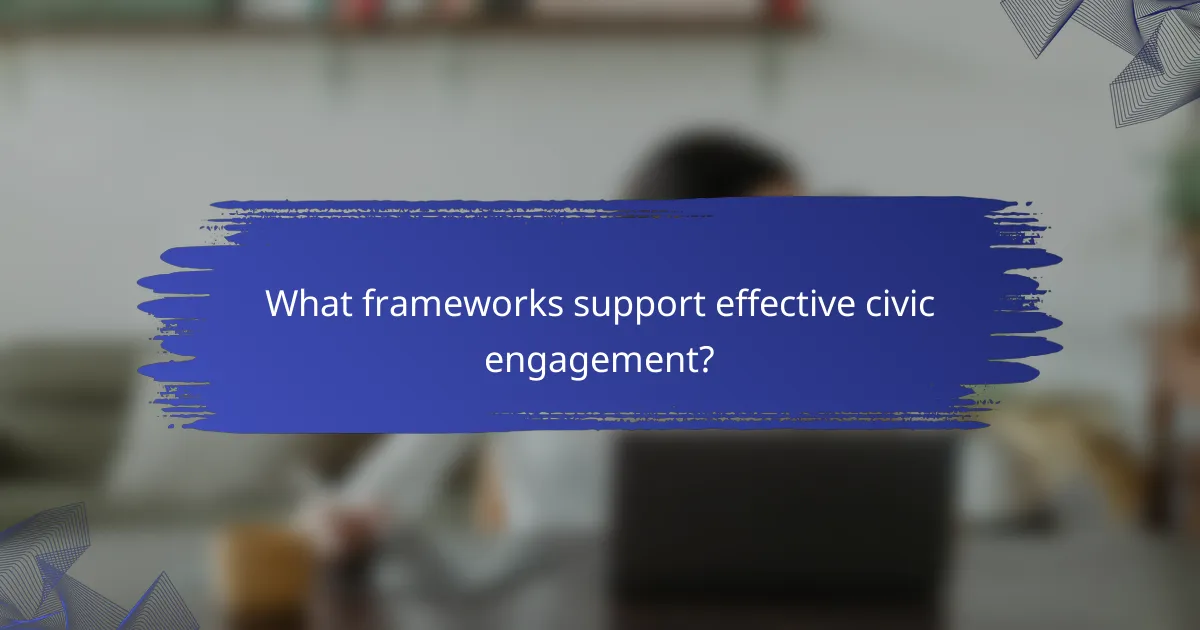
What frameworks support effective civic engagement?
Effective civic engagement is supported by various frameworks that facilitate community participation and decision-making. These frameworks provide structured approaches to involve citizens in governance and local initiatives, enhancing both individual growth and community impact.
Community organizing models
Community organizing models focus on mobilizing individuals and groups to address local issues collectively. These models often emphasize grassroots efforts, where residents identify their needs and work together to advocate for change. Examples include neighborhood associations and advocacy groups that tackle specific social justice issues.
Key steps in community organizing include building relationships, identifying common goals, and developing strategies to achieve those goals. Effective organizers often utilize training sessions to empower community members, ensuring they have the skills needed to engage in civic activities.
Participatory budgeting processes
Participatory budgeting processes allow citizens to directly influence how public funds are allocated within their communities. This framework encourages transparency and accountability by involving residents in budget decisions, often through community meetings and workshops where they can propose and vote on projects.
Typically, participatory budgeting involves several stages: outreach to inform the community, proposal development, voting, and implementation of selected projects. Cities like New York and Paris have successfully implemented these processes, resulting in increased public trust and more responsive governance.
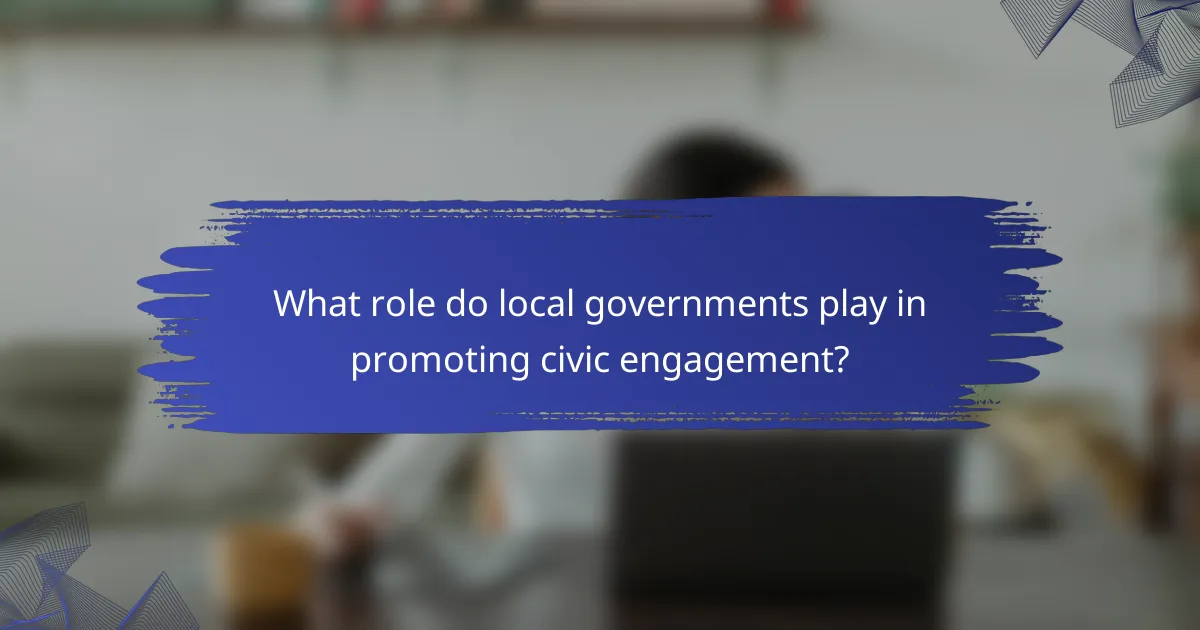
What role do local governments play in promoting civic engagement?
Local governments play a crucial role in fostering civic engagement by creating opportunities for residents to participate in decision-making processes. They implement policies and programs that encourage community involvement, ensuring that citizens have a voice in shaping their local environment.
Facilitating public forums
Local governments facilitate public forums to encourage dialogue between officials and community members. These forums can take various forms, including town hall meetings, workshops, and online discussions, providing platforms for residents to express their views and ask questions.
Effective public forums often feature clear agendas and are scheduled at convenient times to maximize attendance. Local governments should promote these events through social media, newsletters, and community boards to ensure broad participation.
Providing resources for community initiatives
Local governments provide essential resources to support community initiatives aimed at enhancing civic engagement. This can include funding, technical assistance, and access to facilities for organizing events or programs that promote public involvement.
For example, municipalities may offer grants for neighborhood projects or provide training sessions on how to organize community events. By equipping residents with the necessary tools and knowledge, local governments can empower citizens to take an active role in their communities.
